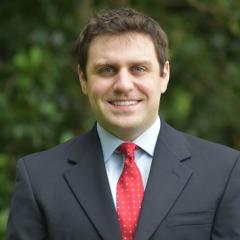Moch reflects on journey to COP27 as AAAS Science & Technology Fellow
Editor's note: originally published in the AAAS Science & Technology Policy Fellowships blog.
COP27: Reflections from a AAAS Science & Technology Policy Fellow
I have a clear memory of the first class that I took on climate change as a college freshman, where I excitedly learned about the United Nations Framework Convention on Climate Change (UNFCCC) and the annual Conference of the Parties (COP) at which nations gather to negotiate on furthering the aims of the Convention. Since then, I have eagerly followed the news out of the annual COPs on the results of the negotiations and the various important climate related announcements that would occur on the sidelines.
This year, as a AAAS Science & Technology Policy Fellow in the State Department’s Office of Global Change, I was honored to take a more active role: I attended COP27 in Sharm El Sheikh, Egypt as part of the team representing the United States.
COP27 was a whirlwind two weeks of exhausting but extraordinarily rewarding days with many twists and turns. My responsibilities primarily focused on two key areas: first, the UNFCCC negotiations regarding processes for assessing science and global progress in addressing climate change; and second, helping with the negotiations of bi- and multi-lateral agreements to deploy climate finance and accelerate decarbonization.
When I became an STPF fellow, I had hoped that some of my Ph.D. and postdoctoral work might benefit my work at the State Department. What I had not foreseen was that my prior experiences with decarbonization and climate modeling would become essential to my role.
“Negotiating science”
Instead of directly negotiating over what the science is, the UNFCCC and Paris Agreement have processes for submitting, evaluating, and agreeing on the implications of scientific information and what information is important. These processes are somewhat analogous to how parties to a legal case submit evidence before a court, in that such submissions form the basis upon which negotiators work. At COPs, countries hear about scientific and technical information relevant to the topic at hand and are then tasked with agreeing on implications, priorities, and next steps.
The three primary negotiation topics that I worked on at COP27 covered different stages of this knowledge accumulation, evaluation, and conclusions process. Two of the negotiations topics, the Periodic Reviewand the Global Stocktake are processes for evaluating the world’s collective progress on addressing climate change to inform future actions. The third topic, Research and Systematic Observations focused on Earth Observations.
At COP27, the Periodic Review was at the end phase of its process: it had finished its “Structured Expert Dialogue” information gathering phase, leaving the negotiations to focus on reaching consensus on the implications and takeaways on the information negotiators heard and read over the previous three years. The Global Stocktake, however, was still in the information gathering “Technical Dialogue phase, so “interventions” (the negotiation term for statements during the negotiation process) were about submitting additional data and evidence into the process. Finally, Research and Systematic Observations covered the full gamut from information assimilation to evaluation and interpretation, with scientific presentations on the state of Earth Observations followed by negotiations on our collective understanding, key takeaways, and future priorities.
For all three topics, my training in the science of climate change and mitigation proved invaluable and allowed me to hit the ground running with a solid understanding of the relevant source material for the topics about which we were negotiating. I was also able to pull directly from my prior experiences to craft opening statements. For example, in one session of the Global Stocktake I drew on my experiences working on air pollution and climate to provide insights on the public health co-benefits of transitions to clean energy. In another Global Stocktake session, drawing on my work as a postdoctoral fellow on decarbonization in the United States, I discussed key components of decarbonizing the energy and industrial sector across all countries and how the recent Inflation Reduction Act is helping the US make progress.
The actual negotiating process for each COP output resembles having a large committee of co-authors editing a paper together in real time, with the various topics split into individual sessions that run in parallel and meet at different times throughout the COP. At the initial negotiation session, parties give statements outlining their positions and what they think should be included in the draft text. Co-facilitators for each negotiation topic then create a proposed draft text upon which parties propose edits and arrive at wording that is agreeable to all. Draft texts for each topic are then sent to a larger corresponding plenary meeting where, if no parties object, they are officially adopted by the Conference of the Parties. For COP27, elements from the various negotiation items also informed a COP Cover Decision which presented the major outcomes.
The end result of the negotiations at COP27 across the three topics I worked on was a text of conclusions agreed to by all parties. The Global Stocktakehad “procedural conclusions” which focused exclusively on setting up meetings next year in the hope that more substantive conclusions could be agreed by Parties at COP28. Both of the Periodic Reviewand Research and Systematic Observationtexts included such “substantive conclusions,” on takeaways from the relevant scientific information or priorities for future work under the UNFCCC, such as needed steps for keeping the 1.5C temperature goal in reach or areas particularly important gaps to fill in the global climate observation system.
Focusing Science on its Policy Implications and Impact
My other major focus at COP27 – negotiations of bi- and multi-lateral agreements to deploy climate finance and accelerate decarbonization, in this case involving Egypt, Mexico, and Indonesia – also drew on my background.
As part of my postdoctoral work, I reviewed and analyzed the modeling literature on pathways for the US to reach net zero carbon emissions by 2050. This work included evaluating and categorizing model and scenario structures and assumptions, identifying important assumptions that might act as policy barriers to reaching net zero, and assessing the key drivers of decarbonization for the US.
For the negotiations regarding Egypt, Mexico, and Indonesia, I was able to build on these experiences and employ a similar analytical approach to directly inform US policy. With input from decarbonization and energy modeling studies for the three countries, independent researchers, and my own calculations, I was able to help evaluate or propose possible decarbonization targets, understand the emissions implications, and build support for US negotiating positions. My work helped form the basis for technical parts of the negotiations, as well as for specific technical meetings where my role was to help reach agreement with other countries on the targets we would aim for and the implications of these targets.
Ultimately, negotiations that I was a part of led to three major announcements during COP27:
-
Egypt, the US, and Germany announceda deal to deploy $500 million to retire 5 GW of natural gas plants in Egypt and replace them with 10 GW of renewables. As part of this announcement, Egypt also announced a target to increase the share of renewable capacity in its electricity mix to 42% by 2030, which would cut around 20% of Egypt's current power sector emissions.
-
Mexico and the US announcedan intention to mobilize financial support and catalyze and incentivize investments to reach around 60 GW of renewable energy in Mexico by 2030, up from only around 20 GW today.
-
Indonesia, together with a group of international partners led by the US and Japan, announcedin a joint statement the launch of a Just Energy Transition Partnership (JETP) for Indonesia. Under this partnership, governments and the private sector pledge to mobilize $20 billion to accelerate decarbonization in Indonesia, leading to a cumulative emissions savings of over 330 megatons of CO2 by 2030 and well over 2 gigatons of CO2 by 2060.
Looking to Future Implementation and to COP28
I expect COP28, which will be hosted next year by the United Arab Emirates, to be a similarly exciting, exhausting, and impactful experience.
The Global Stocktake, which is set to conclude next year, is poised to be one of the major negotiation topics. This item is now moving from the information gathering and technical assessment phases, which end in June at the Subsidiary Body negotiations to the political phase, where countries will evaluate and decide what progress has been made and how it can inform future actions. At COP28 the Global Stocktake negotiations will be very different from COP27, as countries will need to come to agreement on issues such as how successful has the Paris Agreement been so far, what needs to be done going forward, and what lessons we should take from our attempts at addressing climate change so far.
Over the coming year we will also need to show progress towards implementing the agreements with Egypt, Mexico, and Indonesia. The announcements made on the sidelines of COP27 were only the first stage in real steps towards accelerating decarbonization. The US will need to work with Egypt, Mexico, and Indonesia and with partner governments to implement specific and detailed plans to accelerate deployment of renewable energy and to set up paths towards meeting the targets agreed to in the joint statements. This work will not be easy. But having seen firsthand the enthusiasm, breadth of knowledge, and expertise of the US team and the various international teams we have been working with, I am continually optimistic.
So far my STPF fellowship has been exactly what I hoped. It has provided an extraordinary opportunity not only to observe how science can inform policy, but also to have an active role in and make meaningful contributions to policy and have tangible impacts. I look forward to seeing what progress will be made in the year ahead – and to helping make it happen.

